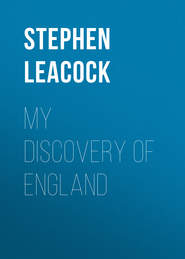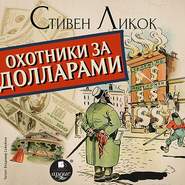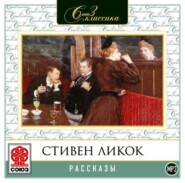По всем вопросам обращайтесь на: info@litportal.ru
(©) 2003-2024.
✖
Behind the Beyond, and Other Contributions to Human Knowledge
Автор
Год написания книги
2019
Настройки чтения
Размер шрифта
Высота строк
Поля
Margaret Harding.
Lady Cicely reads, her eyes widen and her voice chokes with horror.
She advances to him and grips his hand. "What does it mean, Jack, tell me what does it mean?"
"Good God, Cicely, don't speak like that."
"This—these lines—about your father."
"I don't know what it means—I don't care—I hated him, the brute. I'm glad he's dead. I don't care for that. But she's coming here, any minute, and I can't face it."
Lady Cicely, more quietly, "Jack, tell me, did my—did Sir John Trevor ever talk to you about your father?"
"No. He never spoke of him."
"Did he know him?"
"Yes—I think so—long ago. But they were enemies—Trevor challenged him to a duel—over some woman—and he wouldn't fight—the cur."
Lady Cicely (dazed and aghast)—"I—understand—it—now." She recovers herself and speaks quickly.
"Listen. There is time yet. Go to the hotel. Go at once. Tell your mother nothing. Nothing, you understand. Keep her from coming here. Anything, but not that. Ernestine,"—She calls to the maid who reappears for a second—"a taxi—at once."
She hurriedly gets Harding's hat and coat. The stage is full of bustle. There is a great sense of hurry. The audience are in an agony for fear Ernestine is too slow, or calls a four-wheel cab by mistake. If the play is really well put on, you can presently hear the taxi buzzing outside. Mr. Harding goes to kiss Lady Cicely. She puts him from her in horror and hastens him out.
She calls the maid. "Ernestine, quick, put my things, anything, into a valise."
"Madame is going away!"
"Yes, yes, at once."
"Madame will not eat?"
"No, no."
"Madame will not first rest?" (The slow comprehension of these French maids is something exasperating.) "Madame will not await monsieur?
"Madame will not first eat, nor drink—no? Madame will not sleep?"
"No, no—quick, Ernestine. Bring me what I want. Summon a fiacre. I shall be ready in a moment." Lady Cicely passes through a side door into an inner room.
She is scarcely gone when Mrs. Harding enters. She is a woman about forty-five, still very beautiful. She is dressed in deep black.
(The play is now moving very fast. You have to sit tight to follow it all.)
She speaks to Ernestine. "Is this Mr. Harding's apartment?"
"Yes, madame."
"Is he here?" She looks about her.
"No, madame, he is gone this moment in a taxi—to the Hotel Bristol, I heard him say."
Mrs. Harding, faltering. "Is—any one—here?"
"No, madame, no one—milady was here a moment ago. She, too, has gone out." (This is a lie but of course the maid is a French maid.)
"Then it is true—there is some one–" She is just saying this when the bell rings, the door opens and there enters—Sir John Trevor.
"You!" says Mrs. Harding.
"I am too late!" gasps Sir John.
She goes to him tremblingly—"After all these years," she says.
"It is a long time."
"You have not changed."
She has taken his hands and is looking into his face, and she goes on speaking. "I have thought of you so often in all these bitter years—it sustained me even at the worst—and I knew, John, that it was for my sake that you had never married–"
Then, as she goes on talking, the audience realize with a thrill that Mrs. Harding does not know that Sir John married two years ago, that she has come home, as she thought, to the man who loved her, and, more than that, they get another thrill when they realize that Lady Cicely is learning it too. She has pushed the door half open and is standing there unseen, listening. She wears a hat and cloak; there is a folded letter in her hand—her eyes are wide. Mrs. Harding continues:
"And now, John, I want your help, only you can help me, you are so strong—my Jack, I must save him." She looks about the room. Something seems to overcome her. "Oh, John, this place—his being here like this—it seems a judgment on us."
The audience are getting it fast now. And when Mrs. Harding speaks of "our awful moment of folly," "the retribution of our own sins," they grasp it and shiver with the luxury of it.
After that when Mrs. Harding says: "Our wretched boy, we must save him,"—they all know why she says "our."
She goes on more calmly. "I realized. I knew—he is not alone here."
Sir John's voice is quiet, almost hollow. "He is not alone."
"But this woman—can you not deal with her—persuade her—beg her for my sake—bribe her to leave my boy?"
Lady Cicely steps out. "There is no bribe needed. I am going. If I have wronged him, and you, it shall be atoned."
Sir John has given no sign. He is standing stunned. She turns to him. "I have heard and know now. I cannot ask for pity. But when I am gone—when it is over—I want you to give him this letter—and I want you, you two, to—to be as if I had never lived."
She lays the letter in his hand. Then without a sign, Lady Cicely passes out. There is a great stillness in the house. Mrs. Harding has watched Lady Cicely and Sir John in amazement. Sir John has sunk into a chair. She breaks out, "John, for God's sake what does it mean—this woman—speak—there is something awful, I must know."
"Yes, you must know. It is fate. Margaret, you do not know all. Two years ago I married–"
"But this woman, this woman–"
"She is—she was—my wife."
. . . . . .














